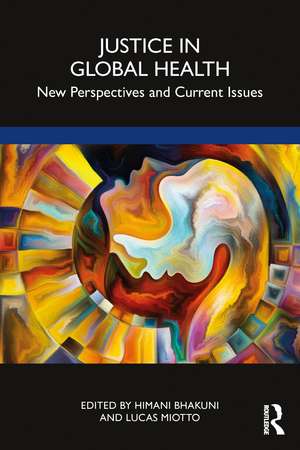Justice in Global Health: New Perspectives and Current Issues
Editat de Himani Bhakuni, Lucas Miottoen Limba Engleză Paperback – 24 oct 2023
The volume features chapters that offer both new theoretical approaches to global health justice, as well as fresh takes on existing frameworks. Others adopt a bottom-up approach to tackle specific problems, including the sexual rights of children and adolescents, artificial intelligence (AI) in medicine, framing of neglected tropical diseases, securitization of health, and trademarks in global health. Brought together within one volume, the breadth of these chapters provides a unique and enlightening contribution to the wider Global Health field.
This important volume will be a fascinating read for students and researchers across Global Health, Bioethics, Political Philosophy, and Global Development.
| Toate formatele și edițiile | Preț | Express |
|---|---|---|
| Paperback (1) | 282.86 lei 3-5 săpt. | +28.41 lei 6-12 zile |
| Taylor & Francis – 24 oct 2023 | 282.86 lei 3-5 săpt. | +28.41 lei 6-12 zile |
| Hardback (1) | 1171.30 lei 6-8 săpt. | |
| Taylor & Francis – 24 oct 2023 | 1171.30 lei 6-8 săpt. |
Preț: 282.86 lei
Nou
Puncte Express: 424
Preț estimativ în valută:
54.15€ • 55.72$ • 45.65£
54.15€ • 55.72$ • 45.65£
Carte disponibilă
Livrare economică 07-21 februarie
Livrare express 23-29 ianuarie pentru 38.40 lei
Preluare comenzi: 021 569.72.76
Specificații
ISBN-13: 9781032508450
ISBN-10: 1032508450
Pagini: 326
Dimensiuni: 156 x 234 x 22 mm
Greutate: 0.6 kg
Ediția:1
Editura: Taylor & Francis
Colecția Routledge
Locul publicării:Oxford, United Kingdom
ISBN-10: 1032508450
Pagini: 326
Dimensiuni: 156 x 234 x 22 mm
Greutate: 0.6 kg
Ediția:1
Editura: Taylor & Francis
Colecția Routledge
Locul publicării:Oxford, United Kingdom
Public țintă
Postgraduate and Undergraduate AdvancedCuprins
0.Introduction. Part I. Citizenship, Power, and Relational Justice. 1.World Citizenship and Global Health. 2.AI-DSS in Healthcare and Their Power over Health Insecure Collectives. Part II. Responsibility for Justice: Law, Civil Society, and the Private Sector. 3.Everything is unconstitutional: contesting structural violence in health systems with legal mobilisation. 4.Framing Noma: Human Rights and Neglected Tropical Diseases as Paths for Advocacy. 5.Trade Marks and the Right to Health: A Growing Tension. Part III. Sexual Rights and Reproductive Justice. 6.The Capability Approach and the Sexual Rights of Children and Adolescents. 7.Reproductive Justice and Ethics of Consent in Assisted Living for Disabled People: A Critical Reflections for Socio-Legal Policies in India. Part IV. Health Governance, Security, and Transitions. 8.Justice in Global Health Governance: The Role of Enforcement. 9.The Ethical Issues Raised by the Securitisation of Health. 10.Transitional Health Justice. Part V. Global Health Justice: New Frames, New Approaches. 11.Redistribution and Recognition in the Pursuit of Health Justice: An Application of Nancy Fraser’s Framework. 12.Beyond the Right to Health: A Confucian Approach to Justice in Global Health. 13.What do we want from a theory of global health justice?
Notă biografică
Himani Bhakuni is a Lecturer at York Law School, United Kingdom. Before that, she was the Assistant Professor of Justice in Global Health Research at University Medical Center, Utrecht University. She primarily works on issues within global health and human rights, particularly on questions surrounding justice, reparations, and global health law.
Lucas Miotto is a Senior Lecturer in Law at the University of Surrey and a core member of the Surrey Centre for Law and Philosophy. He works at the intersection between legal, moral, and political philosophy, dealing with questions about coercion, manipulation, wrongful interference, and forms of just governance.
Lucas Miotto is a Senior Lecturer in Law at the University of Surrey and a core member of the Surrey Centre for Law and Philosophy. He works at the intersection between legal, moral, and political philosophy, dealing with questions about coercion, manipulation, wrongful interference, and forms of just governance.
Descriere
Rather than making another attempt at proposing a single and unifying theory of global health justice, this timely collection brings together, instead, scholars from a range of traditions to frame the issue more broadly, highlighting not only different perspectives but also key topics and debates.
